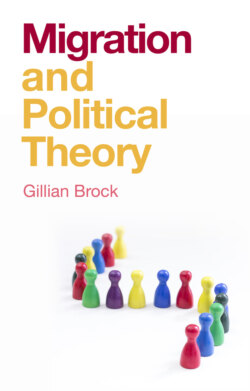Читать книгу Migration and Political Theory - Gillian Brock - Страница 19
2.1.3 Ownership of institutions
ОглавлениеOn Ryan Pevnick’s account (2011), citizens have rights of ownership over the fruits of their collective efforts. The rights arise from the fact that the citizens have labored to produce many of the desirable features of their state. They have raised the revenue required to build valuable public goods, such as basic infrastructure, a system of education, good support for maintaining and regulating an effective market, and so on. Citizens have also invested their own labors in creating and maintaining strong institutions, which then become an important asset in the flourishing communities that many immigrants wish to join. Citizens make all sorts of ongoing contributions to maintaining these institutions, for instance, by paying their taxes and obeying laws and hence contributing to the maintenance of important practices necessary for their ongoing flourishing. And so, because of citizens’ important valuable input into creating and sustaining these institutions, they have relevant ownership claims over them which entitle citizens to decide who may have access to the resources they have created, just as with other legitimate property rights. In short, citizens have special claims to the institutions of their states and important rights to exclude outsiders.
So, on this account, when citizens construct schemes for mutual benefit, such as pension programs or publicly provided healthcare, they gain control over the benefits and resources that these schemes create. After all, it is their efforts and contributions that have generated the central resources that make those states desirable immigration targets.
If Pevnick’s arguments are compelling, then there is a kind of collective ownership over the state’s institutions, though he also concedes that this ownership claim would have limits “including responsibilities toward non-owners” (Pevnick 2011: 12). While he might concede that those from impoverished countries should be allowed to move, this conclusion would still fall considerably short of allowing all free access.
Challenges to this account may be marshaled from various directions. One could question the neat demarcation that Pevnick’s account seems to want to draw between contributions made from within the state and those outside it. Arguably, in economies heavily integrated into the global economic order through high levels of trade, as most countries are these days, many countries contribute to a strong domestic economy capable of sustaining robust pension or healthcare programs, so strong domestic institutions might also require strong international contributions. One might also draw on the history of colonization and conquest to argue that many of the institutions governing particular states today resulted from historical processes and this would seem to suggest citizens of former empires have some claim to citizenship in former colonies, given the contributions of previous generations.
